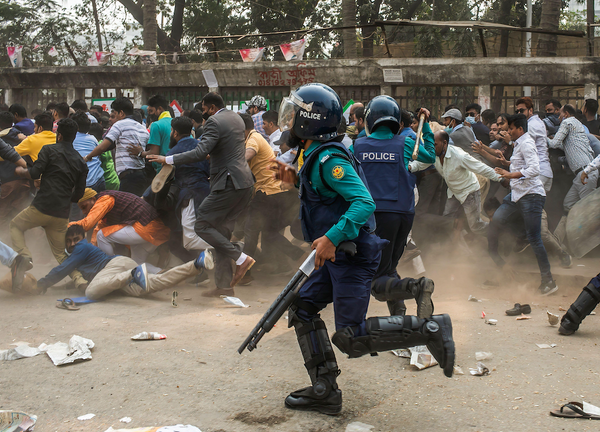Stopping the opposition opposing
Bangladesh government continues to prevent opposition parties from holding meetings and rallies.

In April 2022, the US ambassador to Bangladesh said, the country's “elections have already started”. His point being that it is not just what happens on the election day that determines whether an election is free and fair. It also depends on what happens in the days or months leading up to it.
Well, if the election period has indeed started, the Awami League (AL) government is certainly not letting the opposition participate!
In the first two weeks of June 2022, newspapers have reported that either the police or governing party activists have obstructed or attacked at least 10 opposition Bangladesh Nationalist Party (BNP) rallies/meetings/processions from taking place peacefully around the country.
June 1st — AL student activists attacked a meeting of a BNP side organisation in Chittagong.
June 1st — AL student activists obstructed a BNP event in Noakhali involving the distribution of food to disadvantaged people.
June 3rd — AL student activists attacked a BNP procession in Chittagong.
June 9th — police obstructed a BNP rally in Khulna.
June 10th — police attacked a BNP rally in Feni.
June 10th — police obstructed a BNP rally in Narsingdi.
June 10th — police obstructed a BNP rally in Thakurgoan.
June 10th — police obstructed a BNP rally in Sunamganj.
June 10th — AL student activists attacked a rally by a BNP branch organisation in Patuakhali.
June 13th — Police/AL student activists attacked a BNP rally in Noakhali.
In addition, on June 7th 2022 there was the attack by AL student activists on Zonayed Saki, the chief coordinator of the left wing party, People’s Solidarity Movement in Chittagong.
Last month this writer wrote a column saying that the Awami League government was planning to liberalise its policies to prove to the international community that the next elections would be free and fair.
If so, Awami League politicians have certainly not yet passed on that message to the police and party activists.
One thing we do know is that when the Awami League government wants to stop something, it can do so. Look, for example, at how quickly the government practically ended disappearances/extra judicial killings after the US imposed sanctions. Almost overnight!
So, if Sheikh Hasina wanted the police and her own party activists to stop the harassment of opposition rallies, all she has to do is to give the order, something she does not seem willing to do at the moment.
Of course, the government should not just be allowing the opposition to organise meetings, rallies and protests just when elections approach. An active political opposition is key to a functioning democracy.
In recent years, stopping the BNP from holding public meetings and rallies has been one of the milder ways in which the current Awami League government has sought to stop the party from functioning — widespread arrests of thousands on false charges has been by far the most effective method, along with instilling fear among party activists that they might not just be detained but disappeared or be killed.
While disappearances and killings have now become rare, arresting opposition activists does continue to remain a form of harassment. Take the BNP meeting on May 26th 2022 in Khulna. After the police allegedly attacked the meeting, they filed cases against 92 named BNP local leaders and activists and 500 unnamed individuals. The named BNP activists know they can be arrested at any time — 32 were arrested that night — and, if so, will have to wait weeks or months before they get bail. Some may feel they have to go into hiding as a result. The police refer to “500 unnamed” individuals in the case so that at any time in the future they can arrest any local BNP activist/supporter on the basis that they were one of them.
In this scenario, there is simply no chance of a free and fair election. Until the Awami League government instructs the police and its own party activists to stop harassing the country’s opposition political parties — and indeed drop these fake criminal cases — it will not only continue to be deemed an authoritarian state, as most independent commentators now describe Bangladesh, but there can be no free and fair election.●
/David Bergman